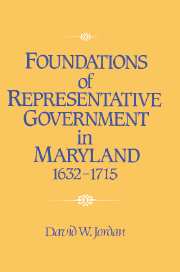Book contents
- Frontmatter
- Contents
- Acknowledgments
- Introduction: “For the Good and Happy Government” of Maryland
- Part I “In the Infancy of This Plantation”: 1632–1660
- Part II “Lord Baltimore's Politick Maximes”: 1660–1689
- Part III “Wee Your Majesties Most Humble and Loyall Subjects”: 1689–1715
- Epilogue: “Our Present Happy Protestant Constitution”
- Appendixes
- A Note on the Sources
- Index
Epilogue: “Our Present Happy Protestant Constitution”
Published online by Cambridge University Press: 14 September 2009
- Frontmatter
- Contents
- Acknowledgments
- Introduction: “For the Good and Happy Government” of Maryland
- Part I “In the Infancy of This Plantation”: 1632–1660
- Part II “Lord Baltimore's Politick Maximes”: 1660–1689
- Part III “Wee Your Majesties Most Humble and Loyall Subjects”: 1689–1715
- Epilogue: “Our Present Happy Protestant Constitution”
- Appendixes
- A Note on the Sources
- Index
Summary
The Assembly of Maryland by 1715 little resembled the rudimentary gathering of freemen that had first met in the young colony eighty years earlier. Now, actual power underlay the rhetoric of legislative privileges and the claims to be the Parliament of Maryland. The central place of the assembly within the governance of the province was safely ensured, and within this now well developed institution, the assertive lower house with its elected membership had achieved a position as the equal of the appointed upper chamber and as the more legitimate representative of the people's interests.
This accomplishment had not come easily. The charter of Maryland, though calling for “the Advice, Assent and Approbation of the Free-Men” or their deputies in effecting “the good and happy Government of the said Province,” had provided no definite design for the expression of that popular voice, and it had concurrently bestowed sweeping authority and power on the Lords Baltimore. The residents of Maryland battled almost a century before the proprietary family acknowledged that it could not keep the province frozen in time like a perpetual fourteenth century palatine of Durham or a subordinate sixteenth century Ireland. The charter's guarantee of a popular legislative voice always provided a potentially powerful instrument for freemen, and determined men eventually made it just that.
J. R. Pole has wisely observed that in the seventeenth century colonies the “governments started by being more popular than in England.” Certainly this was so in many ways in early Maryland.
- Type
- Chapter
- Information
- Foundations of Representative Government in Maryland, 1632–1715 , pp. 233 - 238Publisher: Cambridge University PressPrint publication year: 1988



